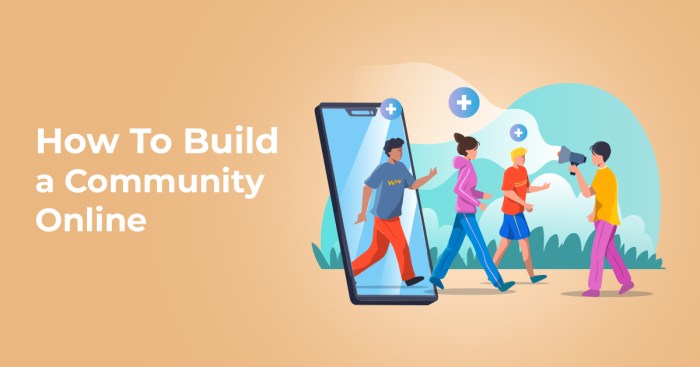Online Community Building is not just a trend, it’s a crucial aspect of business success in today’s digital landscape. From engaging with customers to creating a loyal following, building an online community can make or break a brand’s reputation. Let’s dive into the strategies, tools, and best practices that can help businesses thrive in the online realm.
In this digital age, connecting with your audience goes beyond traditional marketing tactics. Online Community Building is the key to establishing a strong presence and cultivating relationships that last.
Importance of Online Community Building
Building an online community is crucial for businesses in today’s digital age. It allows companies to connect with their target audience on a more personal level, fostering loyalty and trust among customers. By creating a space where like-minded individuals can engage, share ideas, and provide feedback, businesses can gain valuable insights and improve their products or services.
Benefits of Fostering an Online Community
- Increased Brand Loyalty: When customers feel a sense of belonging to a community, they are more likely to remain loyal to the brand.
- Enhanced Customer Engagement: Online communities provide a platform for customers to interact with each other and the brand, leading to higher engagement levels.
- Valuable Feedback: Businesses can gather feedback and suggestions directly from their community members, helping them make informed decisions.
- Word-of-Mouth Marketing: Satisfied community members are likely to recommend the brand to others, leading to organic growth.
Examples of Successful Online Communities and Their Impact
- Apple Support Communities: Apple’s online community allows users to ask questions, share tips, and troubleshoot issues. This has not only reduced customer service costs but also created a sense of community among Apple users.
- Reddit: With millions of active users, Reddit is a prime example of a successful online community. It covers a wide range of topics and has a strong sense of community engagement.
- HubSpot Community: HubSpot’s online community is dedicated to marketing and sales professionals. It provides a platform for networking, learning, and sharing best practices, strengthening relationships with customers.
Strategies for Effective Online Community Building
Building a strong online community requires careful planning and consistent effort. Here are some key strategies to help you initiate and maintain a thriving online community:
Role of Engagement in Building a Strong Online Community
- Create interactive and engaging content to encourage active participation from community members.
- Respond promptly to comments, messages, and inquiries to show that you value and appreciate community engagement.
- Organize contests, polls, and other interactive activities to keep members interested and involved.
- Foster a sense of belonging by recognizing and appreciating the contributions of community members.
Leveraging Social Media Platforms for Community Building
- Identify the social media platforms where your target audience is most active and create a presence on those platforms.
- Share valuable content regularly on social media to attract new members and keep existing ones engaged.
- Use social media features like groups, stories, and live videos to interact with your community in real-time.
- Collaborate with influencers and other brands to expand your reach and connect with new audiences.
Tools and Platforms for Online Community Building

Creating and maintaining an online community requires the right tools and platforms to facilitate engagement and interaction among members.
Popular Tools and Platforms
- Facebook Groups: Ideal for creating a community around a specific topic or interest, with features like polls, events, and announcements.
- Discord: Known for its real-time communication capabilities, making it suitable for gaming communities or groups requiring instant messaging.
- Reddit: A platform with various subreddits catering to different niches, allowing for discussions, sharing of content, and voting on posts.
- LinkedIn Groups: Targeted towards professionals, providing a space for networking, sharing industry insights, and job opportunities.
Comparison of Platforms
| Platform | Features | Suitability |
|---|---|---|
| Facebook Groups | Polls, events, announcements | General interest communities |
| Discord | Real-time communication | Gaming communities, instant messaging |
| Subreddits, discussions | Niche-based communities | |
| LinkedIn Groups | Networking, industry insights | Professional communities |
Tips for Choosing the Right Platform
- Understand your community’s needs and preferences before selecting a platform.
- Consider the type of interaction and communication style required for your community.
- Choose a platform that aligns with your community’s demographics and interests.
- Evaluate the scalability and customization options offered by different platforms.
Best Practices for Engaging Online Communities
Engaging online communities is essential for building a strong and active group of participants. By following best practices, you can foster a sense of belonging and encourage members to contribute regularly.
Methods to Encourage Active Participation
- Create interactive and engaging content that sparks discussion and encourages members to share their thoughts and opinions.
- Run contests, polls, and surveys to involve members and make them feel valued.
- Respond promptly to comments and messages to show that you value and appreciate their input.
- Organize virtual events, webinars, or live streams to connect with members in real-time and provide valuable information.
Importance of Moderation and Community Guidelines
Having clear moderation guidelines is crucial to maintaining a positive and respectful online community. By setting rules and expectations, you can ensure that discussions remain civil and focused on the intended topics.
Examples of Successful Engagement Strategies
- Customer Q&A Sessions: Hosting regular Q&A sessions where customers can ask questions and interact with the brand directly.
- Exclusive Content: Providing exclusive content or sneak peeks to members to keep them engaged and excited about being part of the community.
- User-Generated Content Contests: Encouraging members to create and share their content, such as photos, videos, or stories, and rewarding the best submissions.
- Virtual Meetups: Organizing virtual meetups or networking events to facilitate connections between members and strengthen relationships within the community.
Measuring Success in Online Community Building

Online community building is crucial for businesses and organizations looking to connect with their audience on a deeper level. In order to measure the success of your online community building efforts, it’s important to consider key metrics that can provide valuable insights into the impact of your strategies. Evaluating these metrics can help you understand the effectiveness of your community building initiatives and make informed decisions moving forward.
Key Metrics for Evaluating Success, Online Community Building
- Engagement Rate: Measure the level of interaction and participation within your online community. This includes likes, comments, shares, and overall engagement with your content.
- Membership Growth: Track the growth of your community over time to gauge its popularity and reach. A steady increase in members indicates a thriving online community.
- Retention Rate: Monitor how many members continue to remain active in your community over a period of time. A high retention rate signifies strong community engagement.
- Customer Satisfaction: Gather feedback from community members to assess their satisfaction levels and identify areas for improvement.
Impact on Brand Loyalty and Customer Retention
Building a strong online community can have a significant impact on brand loyalty and customer retention. By fostering meaningful connections with your audience, you can create a sense of belonging and loyalty among community members. This, in turn, leads to increased customer retention rates as satisfied customers are more likely to remain loyal to your brand.
Analyzing Feedback and Adapting Strategies
Feedback from your online community is a valuable source of information that can help you refine your community building strategies. Analyze feedback from members to identify trends, preferences, and areas for improvement. Use this data to adapt your strategies and ensure that your community continues to grow and thrive.





